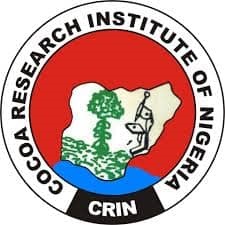• States how commodity boards will fund research, facilitate inputs
• Harps on reviving moribund cocoa processing firms, others
About 10 months into his five-year tenure, the Executive Director (ED) of Cocoa Research Institute of Nigeria (CRIN), Ibadan, Dr. Patrick Adebola, spoke with a few journalists, expressing anger over neglect of the agricultural sector for decades, especially cash crop production and value chain development. To him, Nigeria has enough crop genetic resources, suitable land, and manpower to match and surpass Ghana and Cote d’Ivoire in cocoa production, apart from other crops like oil palm, cashew and kola nuts, Adebola also urges the government to commit more resources to agriculture as a veritable sector to trigger socio-economic development. The excerpts of the interviews, by Femi Ibirogba (Guardian), are as follows:
Cocoa, cashew, palm oil and groundnut were major revenue earners of the country. What is the place of cash crops in reviving Nigeria’s economy now?
We discovered oil and started neglecting other sectors of the economy, especially agriculture and most specifically, the tree crop. This subsector was known for great foreign exchange earnings, but because oil money is easier, we neglected it. Crops like cocoa, cashew, coffee, kola, oil palm trees and some others have been known to be major foreign exchange earners. With the effect of climate change in the world, countries buying our oil are now trying to cut down on gas emission, and thereby cutting volume of oil they import. Producers, like Nigeria, now see a decline in revenue. I believe that if we promote these tree crops, we can reclaim our past sources of revenue for development.
It is planting time for tree crops. Which role is CRIN playing in making seedlings available, as improved seedling is the most important starting point?
Since my assumption of office, we have been supported by the Federal Ministry of Agriculture to timely provide planting materials to farmers. Last year, we were supported to raise about 300,000 seedlings of cocoa and they were distributed to farmers. This year, we raised 500,000 seedlings and we are still in the process of distributing to beneficiaries. Most of the seedlings have been taken up and planted.
We distributed, free of charge, through Agricultural Development Programmes (ADPs), state ministries of agriculture in all cocoa-producing states, farmers’ cooperatives and some private individuals who came to CRIN.
Apart from these means, we now partner individuals and organisations to be licensed to reach farmers even more than what CRIN is doing. We are conducting training for them to become Cocoa Seedlings Entrepreneurs who will reach farmers even in remote areas. They will be selling, but at an affordable price.
There are so many adulterated varieties. How improved are these varieties?
We have two categories of seedlings. About 10 years ago, CRIN produced high-yielding varieties termed TC1-8 series. These are very high-yielding and early-bearing materials. They start to produce pods 18 months to 2 years after seedling transplant on the field. The current production figure of an average cocoa farm is about 400-500kgs per hectare, but the new materials can produce 1500-2000kgs per hectare. So, these improved materials will have a great impact on productivity of farmers.
Apart from those attributes, it is recorded that their flavour is better than old varieties. So, farmers have been requesting these materials. Unfortunately, we have not even been able to satisfy all the requests because producing them involves manual pollination to get true-to-type varieties.
Are you also producing seedlings for cashew?
Cashew is a little bit more technical because when we raise seedlings and people do not come, it is difficult to give them the following year. They would have overgrown. We produce jumbo and Indian dwarf cashew seedlings on request by farmers. But the institute has the capacity to produce whatever number that the farmers are looking for.
Do you mean the demand for cocoa seedlings is greater than cashew?
It is greater than that of cashew. We get requests for cocoa seedlings almost every time, but requests for cashew seedlings are a little bit fewer.
By estimation, when will Nigeria close the production gap between it and Cote D’Ivoire/Ghana?
If you look at cocoa production in Cote d’Ivoire, for example, it is getting about two million tonnes yearly. Nigeria struggles with about 250,000 to 300,000 tonnes. In Ghana and Cote d’Ivoire, the cocoa subsector is well regulated. Nigeria tends to have more hectares than Cote d’Ivoire, but its production is higher than ours. Everything about cocoa in that country is well regulated.Coming back to Nigeria, it is not about how many hectares we have, but about how productive the hectares are. Right now, we are between 400 and 500kgs per hectare, but we have to increase tonnage per hectare to at least 1000-1500kgs.
What does it take to increase cocoa productivity?
All moribund cocoa farms have to be rehabilitated: improve them and make them productive again. This can be done by pruning them, apart from replacing old varieties with new ones. Apart from that, good agricultural practices will get us maximum yield, and this can be done by intensive training of farmers.
One other way is by regulating agro-chemicals that we use on cocoa farms. In Nigeria now, every chemical comes in and farmers use it indiscriminately. This affects the quantity of cocoa we produce and the quality in term of pesticide residue. This leads to rejection of cocoa beans when we export. If the cocoa subsector is more regulated, these things will normalise. Lastly, we are just struggling with research funding, but we have scientists to carry out research on more improved varieties. However, there is poor funding. The
government funding is not enough. This year, we have got a little bit better than what we were getting, but it is still a challenge.
As you said, some people have been calling for re-introduction of commodity boards. Do you think we need a cocoa board?
I think the biggest mistake we made was abolishing the cocoa board. There were
allegations of corruption, but corruption could have been fixed without winding it down. If you look at Cote d’Ivoire and Ghana, their cocoa sectors are doing well because the boards are in place. They regulate their cocoa subsectors. In Nigeria, there is no one-stop shop for cocoa subsector, and I think it is high time the government looked at not only cocoa, but also other commodity boards. They should be brought back.
When the commodity boards are brought back, certain percentage of what they make should be reinvested into research to relieve the government of the burden of exclusively funding research institutes. For example, in South Africa, about one per cent or so is charged for research in crops like potato and others when they export or sell.
Cocoa processing firms in Nigeria have collapsed. Do you see a correlation between reviving the factories and productivity?
I think the best thing to do is to promote local consumption because we cannot continue to have a product which price is dictated by buyers. Nigeria has about 200 million people and we consume chocolate and beverages made from cocoa. Why don’t we encourage local consumption? Nigeria is a huge market if we can start from primary schools. We can incorporate cocoa products into the school feeding programme. We know all the benefits of consuming cocoa-based beverages. If we start to encourage local consumption, the demand for cocoa will go up.
Since you assumed office about 10 months ago, what have you done to move the Institute forward?
Before I assumed office, there were crises in CRIN, and it was known for labour unrest. This reduced the gains of previous administrations. But since I came in, with the help of the CRIN Board Chairman, Alhaji Abdulahi Jao, and members, I have been able to unite stakeholders and brought
stability to CRIN.
In terms of labour, the present management has been able to work hand-in-hand with all the three in-house labour unions and I think I have won their support.
Travelling and burial expenses, transfer allowances to substations and others, and entitlements of people who retired accumulated to more than 80 million Nairabefore I came. But I moved round, and with the help of the Federal Ministry of Agriculture, we got some resources and we have cleared almost all the entitlements. This has
really reduced tension: everybody really appreciates the effort. So, I started from 2017 and cleared all the backlogs owed to the staff. I have embarked on infrastructural facelifts. We are trying to rehabilitate. If you come here before, there was no toilet, but now, the directorates have been fully renovated. Our hall and the boardroom have been given a facelift.
Do you think this has boosted the morale of the workers?
The workers are very proud of CRIN now. I have been able to unify all various factions that were on ground when I came in. Because of the crisis, the system broke into different factions, but now, my leadership style has been able to unify the factions.
One of the major items in my agenda is to revive the culture of research. Because of the crisis in the past, emphasis on research reduced, coupled with the fact that research funding also declined. Now, research activities have started coming up.
We are able to do that through change in leadership positions and reorganisation of various programmes, re-appointments of capable and knowledgeable leaders for research programmes. This has brought a lot of revival.
Also, we have been able to distribute the little fund among research divisions equitably. One of my policies is inclusion; everybody should be carried along in all the activities.
One of the things I do is focusing on infrastructure. There are complaints in terms of non-availability of research materials and equipment. So, since I came, as a matter of priority, I use a certain percentage of funds we get for equipping all our laboratories and these have been going on. We are also lucky with partnering with the World Cocoa Foundation (WCF), for example, for the establishment of a cocoa flavour laboratory, which is the best in West Africa for now. The effort has been ongoing from previous administrations, and when I came, I supported it.
What benefits will the flavour lab add to CRIN and the industry?
We thank WCF for the lab. Out of the four situated in West Africa, Nigeria’s lab is adjudged the best. The other labs are in Coted’Ivoire, Ghana and Cameroon.
It is going to be a reference lab for cocoa flavours in Africa. You can bring your samples and we will test their flavours. This will help farmers to get premium prices for specific flavours of cocoa. The lab will also test all types of cocoa genotypes.
Any concern about child labour on cocoa plantations in Nigeria?
This issue has been raised several times. Some representatives of organisations come to CRIN to ask the same question. Unfortunately, we do not deal directly with the issue of farm labour. We know it exists, but we are concerned primarily about research and giving quality planting materials to farmers.
Child labour is best handled by the Ministry of Labour and Productivity. All that we can do is creating awareness.
Any need for an extension unit to interface with cocoa stakeholders concerning best farm labour practices?
We have been doing that anywhere we go for capacity building. Those are parts of the issues that we discuss with trainees. But it is good to make it formal if the government can create a department in an institute like CRIN.
(https://guardian.ng/features/agro-care/crin-boss-suggests-how-to-match-ghana-ivory-coast-in-cocoa


